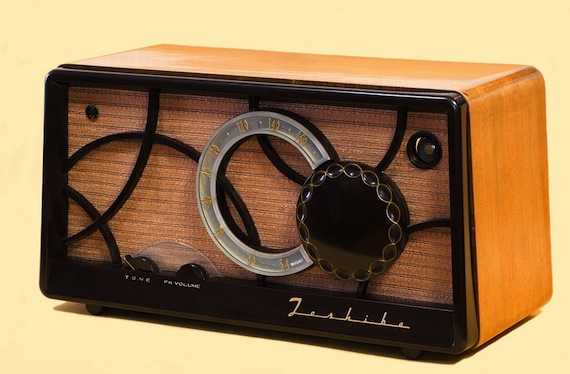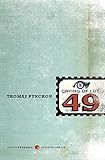
In one scene from Americana, Don DeLillo’s 1971 debut novel, narrator David Bell turns off a light and turns on a radio:
Sound filled the room, huge noise, bass and drums booming out of the speaker, beating and scratching, then the sting of a fierce needling trumpet. In the darkness that trumpet had a deeper beauty, filling space, leaving time behind, a difficult sound departing and returning, and I did not feel I was in a room with four walls. A note hung at eye level, dim speck on the railroad horizon, then vanished into a long silence shaded by the revving bass.

 It is not surprising that a writer so in love with the sounds of language — someone who titled a novel White Noise — would embrace the power of radio as narrative. Yet, like other talented novelists, DeLillo manages to surprise us with the familiar. Elsewhere in the novel, Bell describes a “three-antenna marine-band hi-fi portable radio” belonging to another character. The radio transmitted a “never-ending squall of disc jockey babytalk, commercials for death, upstate bluegrass Jesus, and as we drove through the cloverleaf bedlams and past the morbid gray towns I perceived that all was in harmony, the stunned land feeding the convulsive radio, every acre of the night bursting with a kinetic unity, the logic beyond delirium.”
It is not surprising that a writer so in love with the sounds of language — someone who titled a novel White Noise — would embrace the power of radio as narrative. Yet, like other talented novelists, DeLillo manages to surprise us with the familiar. Elsewhere in the novel, Bell describes a “three-antenna marine-band hi-fi portable radio” belonging to another character. The radio transmitted a “never-ending squall of disc jockey babytalk, commercials for death, upstate bluegrass Jesus, and as we drove through the cloverleaf bedlams and past the morbid gray towns I perceived that all was in harmony, the stunned land feeding the convulsive radio, every acre of the night bursting with a kinetic unity, the logic beyond delirium.”
It is sometimes refreshing to ditch the convenience of playlists and clarity of satellite stations and embrace the surprise of terrestrial radio. The shifting genres of FM. The droning emptiness of AM. I am reminded of “Route 7 Outside Nacogdoches, Texas” by Joe Wilkins, about a long drive down the road, and the narrator’s “good pain inside distance.” There, “the night gone liquor black, / radio catching miles / of static, there was only / the ache of cicadas and wind / and leaves in the wind, / and I did not know I was driving / to you. I was driving.”
Radio is elegiac. Radio is the theater of the mind: our eyes are free to look elsewhere, but the sound bounces in our brains. Two mediums that elicit imagination and subjective experience, radios and literature go well together. As another theater of the mind, literature requires more active listener participation than visual entertainment. Often the synthesis of the two makes narrative magic.
 Mucho Mass, the husband of Oedipa Maas, in The Crying of Lot 49 is a disc jockey for KCUF, a California radio station. The novel is suffused with sound. Mucho was previously a used car salesman, but unlike other hucksters, did not use pencil shavings “for hushing sick transmissions.” Oedipa is haunted by disembodied voices: late-night prank phone calls from her billionaire ex-boyfriend, who disguises his voice as The Shadow, a radio character from the 1930s. Lapsed Catholic he is, Thomas Pynchon makes the radio sacramental: Oedipa imagines Mucho “looking through the soundproof glass at one of his colleagues with a headset clamped on and cueing the next record with movements stylized as the handling of chrism, censer, chalice, might be for a holy man, yet really tuned in to the voice, voices, the music, its message, surrounded by it, digging it, as were all the faithful it went out to.”
Mucho Mass, the husband of Oedipa Maas, in The Crying of Lot 49 is a disc jockey for KCUF, a California radio station. The novel is suffused with sound. Mucho was previously a used car salesman, but unlike other hucksters, did not use pencil shavings “for hushing sick transmissions.” Oedipa is haunted by disembodied voices: late-night prank phone calls from her billionaire ex-boyfriend, who disguises his voice as The Shadow, a radio character from the 1930s. Lapsed Catholic he is, Thomas Pynchon makes the radio sacramental: Oedipa imagines Mucho “looking through the soundproof glass at one of his colleagues with a headset clamped on and cueing the next record with movements stylized as the handling of chrism, censer, chalice, might be for a holy man, yet really tuned in to the voice, voices, the music, its message, surrounded by it, digging it, as were all the faithful it went out to.”
 We want to be surrounded by sound: speakers in front, above, and behind. Literature puts the speakers inside of us. Julian Murphet has considered William Faulkner’s experimentation with levels and layers of “voice” in his novels. Murphet is correct to note that “Faulkner’s career as a novelist is coeval with the rise of one of the most astonishing cultural events in any nation’s history: the present-tense linking up of American cities from coast to coast, thanks to syndication and electromagnetic propagation, through voices speaking into living rooms and office spaces ‘out of the air’ and directly into the resonant chambers of the soul.” Murphet quotes Theodor Adorno’s Current of Music to supplement the point: “The absence of visible persons makes the ‘radio voice’ appear more objective and infallible than a live voice; and the mystery of a machine which can speak may be felt in atavistic layers of our psychical life.” In Faulkner’s work, Murphet sees “how the art of the novel is adapted, in a state of emergency, to absorb these new, disembodied voices of radio and gramophone, not as alien impositions on the living speech and dialogic richness of an expanding nation but precisely as the transfiguration through mechanical mediation” of our selves and souls.
We want to be surrounded by sound: speakers in front, above, and behind. Literature puts the speakers inside of us. Julian Murphet has considered William Faulkner’s experimentation with levels and layers of “voice” in his novels. Murphet is correct to note that “Faulkner’s career as a novelist is coeval with the rise of one of the most astonishing cultural events in any nation’s history: the present-tense linking up of American cities from coast to coast, thanks to syndication and electromagnetic propagation, through voices speaking into living rooms and office spaces ‘out of the air’ and directly into the resonant chambers of the soul.” Murphet quotes Theodor Adorno’s Current of Music to supplement the point: “The absence of visible persons makes the ‘radio voice’ appear more objective and infallible than a live voice; and the mystery of a machine which can speak may be felt in atavistic layers of our psychical life.” In Faulkner’s work, Murphet sees “how the art of the novel is adapted, in a state of emergency, to absorb these new, disembodied voices of radio and gramophone, not as alien impositions on the living speech and dialogic richness of an expanding nation but precisely as the transfiguration through mechanical mediation” of our selves and souls.
 As I Lay Dying — perhaps Faulkner’s finest and most sonorous work — ends with a chapter narrated by Cash, the apostolic carpenter son. The chapter’s first sentence: “So when we stopped there to borrow the shovels we heard the graphophone playing in the house.” As the chapter goes on, Cash notes when the music plays, and when it stops: “So we set in the wagon, but the music wasn’t playing now. I reckon it’s a good thing we aint got ere a one of them. I reckon I wouldn’t never get no work done a-tall for listening to it. I dont know if a little music aint about the nicest thing a fellow can have.”
As I Lay Dying — perhaps Faulkner’s finest and most sonorous work — ends with a chapter narrated by Cash, the apostolic carpenter son. The chapter’s first sentence: “So when we stopped there to borrow the shovels we heard the graphophone playing in the house.” As the chapter goes on, Cash notes when the music plays, and when it stops: “So we set in the wagon, but the music wasn’t playing now. I reckon it’s a good thing we aint got ere a one of them. I reckon I wouldn’t never get no work done a-tall for listening to it. I dont know if a little music aint about the nicest thing a fellow can have.”
The family is about to meet the new Ms. Bundren. She is holding a graphophone. As the novel ends, Cash thinks how “everytime a new record would come from the mail order and us setting in the house in the winter, listening to it, I would think what a shame Darl couldn’t be to enjoy it too.” Faulkner chose to have Cash articulate his emotional and spiritual distance from his brother through their inability to share sound.
In John Cheever’s “The Enormous Radio,” Jim and Irene Westcott share sound, until “One Sunday afternoon, in the middle of a Schubert quartet, the music faded away altogether.” Broken, the radio was replaced with a “large gumwood cabinet” that occupied their apartment “like an aggressive intruder.” A clear and pure tone is later replaced with crackling and rustling, as the radio begins transmitting the surrounding world. Private and intimate conversations whisper from the radio. Also: “a monologue on salmon fishing in Canada, a bridge game, running comments on home movies of what had apparently been a fortnight at Sea Island, and a bitter family quarrel about an overdraft at the bank.” Soon the “hideous cabinet,” the ugly God of a machine tunes into the Westcott’s own sins and fears.
We learn how to live through radios. Within Eduardo Corral’s poem “In Colorado My Father Scoured and Stacked Dishes,” the father “learned English / by listening to the radio. The first four words / he memorized: In God We Trust.” Radio delivers us news, both public and personal. In “Easter, 1960” by Sharon Olds, a hospital uses an “ancient boarding-school radio” to announce that the speaker’s boyfriend was one of two men brought to the emergency room after a car crash: “one of them / critical, one of them dead.”
Back to DeLillo’s Americana, where the “radio was announcing a sale on ground round steak and then some old-time rock came on, lush and mystical, cockney voices wailing through a prayer wheel of electric sitars.” Radio is like literature, like our thoughts: moving, shifting, often clouded in static, and yet sometimes out of the maddening noise comes clarity.
Image Credit: Pixabay.









